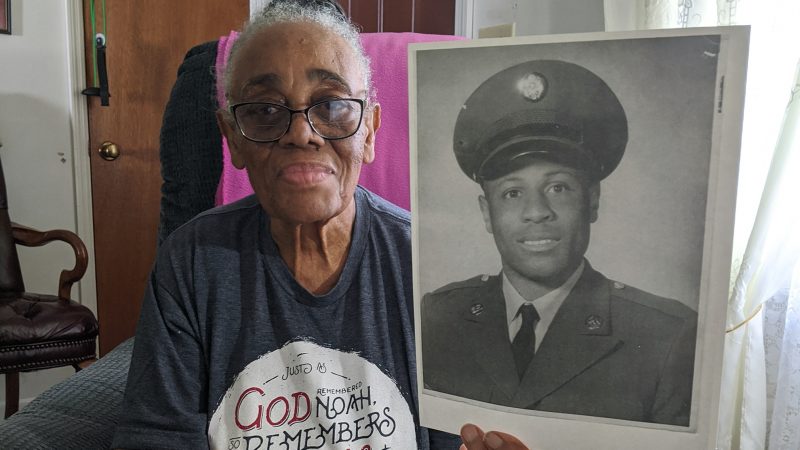Remembering A Life Lost To COVID-19 Behind Bars
William Hershell Moon Sr. grew up in a big family. He had more than a dozen siblings and many called him “Hershell.” He was born and raised in Sylacauga.
Sometime after high school, Hershell enlisted in the army and served in the Vietnam War. After being discharged for medical reasons, he returned to Sylacauga and started dating Janet Moon. Moon said Hershell liked to take her out, sometimes to a restaurant or to the local fair.
“He was a good person, a real good person,” Moon said.
The couple married in April 1975 and had two children. But there were challenges.
“A year after we got married, he started changing,” Moon said. “And we started fighting.”
She said Hershell struggled to control his emotions and when he drank, he would often get angry. Within a few years, the couple separated. Hershell left Sylacauga and moved to Birmingham.
Years later, in 2000, Hershell was convicted of murder and was sentenced to life in prison with the possibility of parole.
While incarcerated, Hershell reconnected with his older sister, Magalene Moon Brazier. Brazier said they had lost touch for many years, but when she found out her brother was in prison, she started visiting him.
“It was real nice, real nice,” Brazier said. “I was glad to see him.”
But she said prison took a toll on him.
“He was all right in a sense, but again he wasn’t. He wasn’t the William, the Hershell that I knew,” she said.
Over the years, Brazier became Hershell’s main contact in the free world. Every few months, she would send him money to pay for snacks or stamps. She kept visiting in person until he was transferred to a different prison farther away.
Eventually, Hershell’s health started to decline. He had stomach and heart problems and later had a stroke. Brazier said they tried to keep up through letters.
“He done a lot of writing before he had the stroke,” she said.
In his letters, Brazier said Hershell often complained about poor medical treatment in prison and he wrote to judges asking for early release. But he remained locked up.
Hershell was transferred to different prisons over the years. He was at St. Clair Correctional Facility when COVID-19 started spreading. In late May, the 74-year old tested positive for the virus and was transferred to a hospital.
Magalene Brazier found out Hershell was sick days later when she called the prison to ask about him. On his last day in the hospital, Brazier talked with him via video call.
“I could tell he was, he was just swollen so bad. He was in bad shape,” she said. “And it just bothered me, because they didn’t let me know earlier.”
Hershell died a few hours after talking with his sister.
He left behind seven children. Brazier said he wasn’t close with many family members, and there was a lot she didn’t know about him. But she tried to help Hershell when she could.
“That’s my brother,” Brazier said. “Regardless of what he done, I love him. God love us. He forgives us for all our sins.”
William Hershell Moon Sr. was born January 17, 1946 and passed away June 2, 2020. He is one of almost 2,500 people in Alabama who have died from the coronavirus, 22 of whom were incarcerated in state prisons.
House Dem. Leader Jeffries responds to air strikes on Iran by U.S. and Israel
NPR's Emily Kwong speaks to House Minority Leader Hakeem Jeffries (D-NY), who is still calling for a vote on a war powers resolution following a wave of U.S.- and Israel-led airstrikes on Iran.
Iran’s Ayatollah Ali Khamenei is killed in Israeli strike, ending 36-year iron rule
Khamenei, the Islamic Republic's second supreme leader, has been killed. He had held power since 1989, guiding Iran through difficult times — and overseeing the violent suppression of dissent.
Found: The 19th century silent film that first captured a robot attack
A newly rediscovered 1897 short by famed French filmmaker Georges Méliès is being hailed as the first-ever depiction of a robot in cinema.
‘One year of failure.’ The Lancet slams RFK Jr.’s first year as health chief
In a scathing review, the top US medical journal's editorial board warned that the "destruction that Kennedy has wrought in 1 in office might take generations to repair."
Here’s how world leaders are reacting to the US-Israel strikes on Iran
Several leaders voiced support for the operation – but most, including those who stopped short of condemning it, called for restraint moving forward.
How could the U.S. strikes in Iran affect the world’s oil supply?
Despite sanctions, Iran is one of the world's major oil producers, with much of its crude exported to China.




